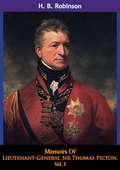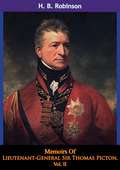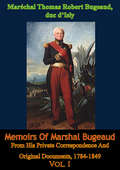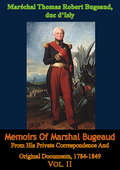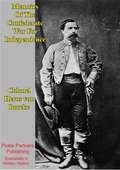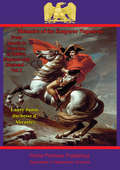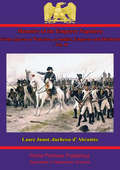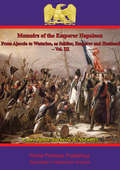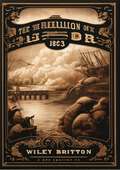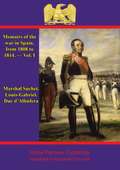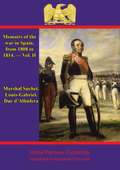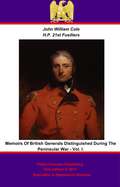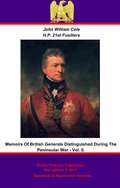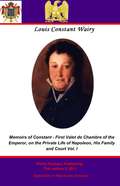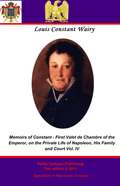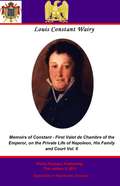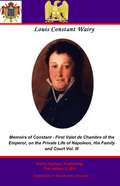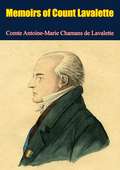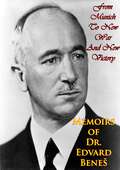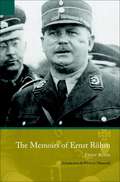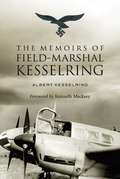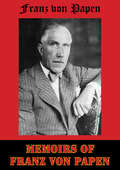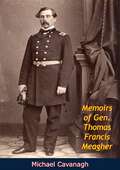- Table View
- List View
Memoirs Of Lieutenant-General Sir Thomas Picton, Vol. I (Memoirs Of Lieutenant-General Sir Thomas Picton)
by H. B. RobinsonWhen Lt.-General Thomas Picton fell during a furious bayonet charge he left behind a legacy of hard fighting, high courage, volatile temper and much military glory accrued at the head of his fighting 3rd Division. In this excellent and very detailed biography, based on the Generals own private letters, recounts his long service and glittering career in the Peninsular War and the Waterloo Campaign.Includes over 100 maps of the actions, engagements and battles of the entire Peninsular War.
Memoirs Of Lieutenant-General Sir Thomas Picton, Vol. II (Memoirs Of Lieutenant-General Sir Thomas Picton)
by H. B. RobinsonWhen Lt.-General Thomas Picton fell during a furious bayonet charge he left behind a legacy of hard fighting, high courage, volatile temper and much military glory accrued at the head of his fighting 3rd Division. In this excellent and very detailed biography, based on the Generals own private letters, recounts his long service and glittering career in the Peninsular War and the Waterloo Campaign.Includes over 100 maps of the actions, engagements and battles of the entire Peninsular War.
Memoirs Of Marshal Bugeaud From His Private Correspondence And Original Documents, 1784-1849 Vol. I (Memoirs Of Marshal Bugeaud #1)
by Charlotte M. Yonge Henri Amédée le Lorgne comte d’ Ideville Maréchal Thomas Robert Bugeaud duc d’Isly"Next after the greatest military personage of the century, Napoleon I., the most perfect is Marshal Bugeaud."Originally published following the disastrous Franco-Prussian War of 1870, and soon after translated into English, these memoirs form a fascinating portrait of the famous "Père Bugeaud". Marshal Bugeaud had a long and varied career in the French Army; initially volunteering as a young Vélite of the Imperial Guard he followed Napoleon and his eagles to Austerlitz, Jena and Eylau before a long sojourn in Spain under Marshal Suchet. As a colonel he rallied to Napoleon during the Hundred Days and fought with distinction under his former chief Suchet in the Alps; with the restoration of the Bourbons after Waterloo, Bugeaud like many of his fellow officers retired from the service.Bugeaud happily busied himself with agriculture and local improvements in his native region; however the July revolution of 1830 catapulted him back into the army with the rank of Brigadier. His disapproval of the conquest of Algeria was overcome by his devotion to the new king, Louis Philippe, and he sailed to Africa in 1836. Bugeaud instituted a rapid, brilliant campaign of flying columns to subjugate the native forces under Abd-el-Kader and signed what was intended to be a lasting peace in 1837 before returning to France. Bugeaud returned to Algeria in 1840 as Governor-General, as conflict loomed large; he proceeded with brutal but successful tactics for supressing the incipient revolt and crushed the last opposition to French rule at the battle of Isly in 1844. Promoted to Maréchal de France for his great victory he left a lasting legacy among the officers and men that served under him and across the map of the French Empire."Marshal Bugeaud, Duke of Isly, was certainly a more remarkable man than nine out of ten who have been the idol of a biographer, and his career is fertile in episodes or incidents characteristic of the times, and throwing light on history"
Memoirs Of Marshal Bugeaud From His Private Correspondence And Original Documents, 1784-1849 Vol. II (Memoirs Of Marshal Bugeaud #2)
by Charlotte M. Yonge Henri Amédée le Lorgne comte d’ Ideville Maréchal Thomas Robert Bugeaud duc d’Isly"Next after the greatest military personage of the century, Napoleon I., the most perfect is Marshal Bugeaud."Originally published following the disastrous Franco-Prussian War of 1870, and soon after translated into English, these memoirs form a fascinating portrait of the famous "Père Bugeaud". Marshal Bugeaud had a long and varied career in the French Army; initially volunteering as a young Vélite of the Imperial Guard he followed Napoleon and his eagles to Austerlitz, Jena and Eylau before a long sojourn in Spain under Marshal Suchet. As a colonel he rallied to Napoleon during the Hundred Days and fought with distinction under his former chief Suchet in the Alps; with the restoration of the Bourbons after Waterloo, Bugeaud like many of his fellow officers retired from the service.Bugeaud happily busied himself with agriculture and local improvements in his native region; however the July revolution of 1830 catapulted him back into the army with the rank of Brigadier. His disapproval of the conquest of Algeria was overcome by his devotion to the new king, Louis Philippe, and he sailed to Africa in 1836. Bugeaud instituted a rapid, brilliant campaign of flying columns to subjugate the native forces under Abd-el-Kader and signed what was intended to be a lasting peace in 1837 before returning to France. Bugeaud returned to Algeria in 1840 as Governor-General, as conflict loomed large; he proceeded with brutal but successful tactics for supressing the incipient revolt and crushed the last opposition to French rule at the battle of Isly in 1844. Promoted to Maréchal de France for his great victory he left a lasting legacy among the officers and men that served under him and across the map of the French Empire."Marshal Bugeaud, Duke of Isly, was certainly a more remarkable man than nine out of ten who have been the idol of a biographer, and his career is fertile in episodes or incidents characteristic of the times, and throwing light on history"
Memoirs Of The Confederate War For Independence [Illustrated Edition]
by Colonel Heros von BorckeIncludes Civil War Map and Illustrations Pack - 224 battle plans, campaign maps and detailed analyses of actions spanning the entire period of hostilities.Coming all the way from Prussia, Colonel Heros von Borcke travelled further than many soldiers to join the Confederate cause, and was assigned to J.E.B. Stuart with whom he became firm friends. Stuart was to write of his giant Prussian companion in arms: "Capt. Heros von Borcke, a Prussian cavalry officer, who lately ran the blockade, assigned me by the honorable Secretary of War, joined in the charge of the First Squadron in gallant style, and subsequently, by his energy, skill, and activity, won the praise and admiration of all."After much gallantry during the campaigns in Northern Virginia and Maryland, he was incapacitated early on during the Gettysburg campaign. Having recovered, he fought on at Stuart's side until his commander's death at the battle of Yellow Tavern. After the Civil War he retired back to his native lands in Germany where he flew the Confederate flag from the battlements.His memoirs of his adventures with the Confederate army are filled with exciting battle scenes, witty anecdotes of the personalities of the army and flavoured with an expert's eye for military detail. Author -- Colonel Heros von Borcke, 1835-1895.Text taken, whole and complete, from the edition published in Philadelphia: Lippincott, 1867.Original Page Count - viii and 438 pages.
Memoirs Of The Emperor Napoleon – From Ajaccio To Waterloo, As Soldier, Emperor And Husband – Vol. I (Memoirs Of The Emperor Napoleon – From Ajaccio To Waterloo, As Soldier, Emperor And Husband #1)
by Anon Laure Junot duchesse d’Abrantès S. M. HamiltonLaure Junot, Duchesse d'Abrantes stands as one of the most influential figures in shaping the Napoleonic era: she was no statesman, military or civil leader, but she was a hugely well connected member of the court of Napoleon, and an inveterate gossip. An old family friend of the Bonaparte's from Corsica, she was married to one of Napoleon's oldest friends Andoche Junot, thus moving in the highest circles in Paris, known by and knowing everyone of note. Originally written at huge length (some editions run to more than 12 volumes), this English edition provides the highlights of her witty, irreverent, yet highly informative memoirs of the reign of Napoleon.
Memoirs Of The Emperor Napoleon – From Ajaccio To Waterloo, As Soldier, Emperor And Husband – Vol. II (Memoirs Of The Emperor Napoleon – From Ajaccio To Waterloo, As Soldier, Emperor And Husband #2)
by Anon Laure Junot duchesse d’Abrantès S. M. HamiltonLaure Junot, Duchesse d'Abrantes stands as one of the most influential figures in shaping the Napoleonic era: she was no statesman, military or civil leader, but she was a hugely well connected member of the court of Napoleon, and an inveterate gossip. An old family friend of the Bonaparte's from Corsica, she was married to one of Napoleon's oldest friends Andoche Junot, thus moving in the highest circles in Paris, known by and knowing everyone of note. Originally written at huge length (some editions run to more than 12 volumes), this English edition provides the highlights of her witty, irreverent, yet highly informative memoirs of the reign of Napoleon.
Memoirs Of The Emperor Napoleon – From Ajaccio To Waterloo, As Soldier, Emperor And Husband – Vol. III (Memoirs Of The Emperor Napoleon – From Ajaccio To Waterloo, As Soldier, Emperor And Husband #3)
by Anon Laure Junot duchesse d’Abrantès S. M. HamiltonLaure Junot, Duchesse d'Abrantes stands as one of the most influential figures in shaping the Napoleonic era: she was no statesman, military or civil leader, but she was a hugely well connected member of the court of Napoleon, and an inveterate gossip. An old family friend of the Bonaparte's from Corsica, she was married to one of Napoleon's oldest friends Andoche Junot, thus moving in the highest circles in Paris, known by and knowing everyone of note. Originally written at huge length (some editions run to more than 12 volumes), this English edition provides the highlights of her witty, irreverent, yet highly informative memoirs of the reign of Napoleon.
Memoirs Of The Marne Campaign
by General Max Clemens Lothar Freiherr von HausenGeneral Baron von Hausen, after a long and successful career in the Royal Saxon Army, was charged with the most important command of his career as the head of the German Third Army in 1914. The army participated in the Battle of the Frontiers, mainly in the battles of Dinant and Charleroi gained infamy for their responsibility for the destruction of Reims in September 1914. After the Second Army's was forced back after the First Battle of the Marne, Von Hausen saw his own flank exposed and ordered a retreat. Upon the stabilization of the front on the river Aisne, Von Hausen was made a scapegoat for the failure of the Schlieffen Plan and relieved of his command and replaced by General Karl von Einem. Affronted by the stain on his and his Saxon comrades, von Hausen considered it his duty to write his personal testimony concerning the Third Army under his command. Kircheisen comments that "According to the most authoritative sources, the Battle of the Marne can not be considered as a strategic defeat for the Germans. It should be regarded rather as a battle lost by us on account of tactical reasons".
Memoirs Of The Rebellion On The Border, 1863
by Wiley Britton“Wiley Britton wrote memoirs covering the Civil War much like better known and more esteemed soldiers of that war. But what makes Britton’s account stand out is where he fought: the Trans-Mississippi Theater. In Memoirs of the Rebellion on the Border, 1863, Britton takes readers west with as a member of the 6th Kansas cavalry. In addition to discussing the movements of the main armies, Britton describes the guerrilla warfare, Native American affairs, and the tension between civilian populations in border states like Missouri and Kansas, which had contributed so greatly to the sectionalism of the 1850s via the debate over whether they should be free states or slave states. He is also objective about his service, noting acts of kindness and destruction perpetrated by Union forces in the region. Britton covers serious events, but he does so with anecdotes and a sprinkling of humor, including lively depictions of what life was like in camp.”-Print ed.
Memoirs Of The War In Spain, From 1808 To 1814. — Vol. I (Memoirs Of The War In Spain, From 1808 To 1814 #1)
by Anon. Marshal Louis-Gabriel Suchet, Duc d'Albufera"If I had had two Marshals like Suchet I should not only have conquered Spain, but have kept it." This was the measured and just opinion of Marshal Suchet. Out of the graveyard for reputation that Spain became for the French generals, Marshal Suchet's ability, aplomb and shrewdness gained him the unique distinction of being awarded his marshal's dignity to his services in Spain.In his memoirs of the War in Spain, he recounts his experiences with honesty, balance and verve. His exciting battle narratives are interspersed with his expert appreciations of the situation as the Peninsular slipped from French grasp and the often acrimonious relations between the French commanders. With the fanatical resistance of the Spanish people, a lack of co-ordination, few supplies and growing British pressure, the achievement of Suchet under such circumstances is truly brilliant. A humble and moderate man, Suchet wrote his memoirs as he commanded in the field, with dash, brilliance, balance and poise.A fine addition to the library of anyone interested in the Peninsular War.Author --Marshal Suchet, Louis-Gabriel, Duc d'Albufera, 1770-1826Translator -- Anon.Text taken, whole and complete, from the edition published in London: H. Colburn, 1829.Original Page Count - lvi and 344 pages.
Memoirs Of The War In Spain, From 1808 To 1814. — Vol. II (Memoirs Of The War In Spain, From 1808 To 1814 #2)
by Anon. Marshal Louis-Gabriel Suchet, Duc d'Albufera"If I had had two Marshals like Suchet I should not only have conquered Spain, but have kept it." This was the measured and just opinion of Marshal Suchet. Out of the graveyard for reputation that Spain became for the French generals, Marshal Suchet's ability, aplomb and shrewdness gained him the unique distinction of being awarded his marshal's dignity to his services in Spain.In his memoirs of the War in Spain, he recounts his experiences with honesty, balance and verve. His exciting battle narratives are interspersed with his expert appreciations of the situation as the Peninsular slipped from French grasp and the often acrimonious relations between the French commanders. With the fanatical resistance of the Spanish people, a lack of co-ordination, few supplies and growing British pressure, the achievement of Suchet under such circumstances is truly brilliant. A humble and moderate man, Suchet wrote his memoirs as he commanded in the field, with dash, brilliance, balance and poise.A fine addition to the library of anyone interested in the Peninsular War.Author --Marshal Suchet, Louis-Gabriel, Duc d'Albufera, 1770-1826Translator -- Anon.Text taken, whole and complete, from the edition published in London: H. Colburn, 1829.Original Page Count - 499 pages.
Memoirs of British Generals Distinguished During The Peninsular War. Vol I. (Memoirs of British Generals Distinguished During The Peninsular War. #1)
by Pickle Partners Publishing John William ColeThis ebook is purpose built and is proof-read and re-type set from the original to provide an outstanding experience of reflowing text for an ebook reader. Although biographies of Duke of Wellington abound, there few biographies of the generals that fought alongside him and executed his orders (or in some cases disobeyed them). The author John William Cole was well placed to provide the details of their lives being a long serving soldier in the British Army; his biographical sketches of the generals are accurate, pithy and although tactful he does not avoid dealing with their faults such as Beresford's less than impressive performance at Albuera. Battles such as Coruña, the Coa, Salamanca, Vittoria, and Waterloo are covered in excellent detail in the round, and particular focus is shown to the actions of the generals in question. This volume chronicles the lives of No. I. -- SIR JOHN MOORE. No. II -- SIR DAVID BAIRD. No. III. -- THE MARQUESS OF ANGLESEY. No. IV. -- SIR EDWARD PAGET. No. V. -- LORD BERESFORD. No. VI. -- MAJOR-GENERAL ROBERT CRAUFURD. No. VII. -- SIR G. LOWRY COLE. Author - John William Cole (????-1870) Text taken, whole and complete, from the edition published in 1856, London, by Richard Bentley. Original - xiii and 352 pages. Illustrations- 3 Portraits Linked TOC
Memoirs of British Generals Distinguished in the Peninsular War. Vol. II (Memoirs of British Generals Distinguished in the Peninsular War #2)
by Pickle Partners Publishing John William ColeThis ebook is purpose built and is proof-read and re-type set from the original to provide an outstanding experience of reflowing text for an ebook reader. Although biographies of Duke of Wellington abound, there few biographies of the generals that fought alongside him and executed his orders (or in some cases disobeyed them). The author John William Cole was well placed to provide the details of their lives being a long serving soldier in the British Army; his portraits are full of descriptive detail, without being too biased, he discusses the contentious issues as well as the victories they achieved. From the fiery, foul-mouthed Picton, respected but not loved by his men, to the quiet dignified "Daddy" Hill, who was adept at taking care of his own troops as well as surprising the French; the British generals were a diverse group worthy of individual attention that the author gave them. This volume chronicles the lives of No. VIII. -- SIR THOMAS PICTON. No. IX. -- LORD LYNEDOCH. No. IX. -- EARL OF HOPETOUN. No. X. -- LORD HILL. No. XII. -- MAJOR-GENERAL LE MARCHANT. No. XII. -- MAJOR-GENERAL ROSS. No. XIII. -- SIR EDWARD PAKENHAM. Author - John William Cole (????-1870) Text taken, whole and complete, from the edition published in 1856, London, by Richard Bentley. Original - 367 pages. Illustrations- 3 Portraits Linked TOC
Memoirs of Constant - First Valet de Chambre to the Emperor. Vol I (Memoirs of Constant - First Valet de Chambre to the Emperor #1)
by Elizabeth Gilbert Martin Imbert de Saint Martin Louis Constant WairyLouis Constant Wairy, mainly known as Constant through-out his life and as the author of his memoirs, was a man intimately connected to General Bonaparte and his wife Josephine Beauharnais, and later in their incarnation as Emperor and Empress of the French. Achieving the rank of first valet de chambre to the Emperor after the previous incumbent Louis Marchand, who also wrote a memoir of his experiences shadowing Napoleon, had abandoned him in 1814.A definite admirer of the Emperor, his place in the Emperor’s household allowed access to the Great man and as he says himself;“From the departure of the First Consul for the campaign of Marengo, whither I attended him, until the departure from Fontainebleau, where I was obliged to leave the Emperor, I was absent from him only twice, the first time for three times twenty-four hours, the second for seven or eight days. Aside from these brief holidays, the last of which was necessary in order to restore my health, I quitted the Emperor no more than his shadow did.”For this reason alone ensures that the memoirs which he wrote, and although not quite the “warts and all” portrait that Constant might have us believe it is of capital interest to the general reader and the Napoleonic enthuasiast.Author – Louis Constant Wairy, known as Constant 02nd December 1778-1845Foreword - Imbert de Saint-Amand. 1834-1900
Memoirs of Constant - First Valet de Chambre to the Emperor. Vol I (Memoirs of Constant - First Valet de Chambre to the Emperor #4)
by Pickle Partners Publishing Elizabeth Gilbert Martin Imbert de Saint Martin Louis Constant WairyThis ebook is purpose built and is proof-read and re-type set from the original to provide an outstanding experience of reflowing text for an ebook reader. Louis Constant Wairy, mainly known as Constant through-out his life and as the author of his memoirs, was a man intimately connected to General Bonaparte and his wife Josephine Beauharnais, and later in their incarnation as Emperor and Empress of the French. Achieving the rank of first valet de chambre to the Emperor after the previous incumbent Louis Marchand, who also wrote a memoir of his experiences shadowing Napoleon, had abandoned him in 1814. A definite admirer of the Emperor, his place in the Emperor's household allowed access to the Great man and as he says himself; "From the departure of the First Consul for the campaign of Marengo, whither I attended him, until the departure from Fontainebleau, where I was obliged to leave the Emperor, I was absent from him only twice, the first time for three times twenty-four hours, the second for seven or eight days. Aside from these brief holidays, the last of which was necessary in order to restore my health, I quitted the Emperor no more than his shadow did." For this reason alone ensures that the memoirs which he wrote, and although not quite the "warts and all" portrait that Constant might have us believe it is of capital interest to the general reader and the Napoleonic enthuasiast. Text taken, whole and complete, from the 1907 edition published in New York by Century, Original 367 pages. Author - Louis Constant Wairy, known as Constant 02nd December 1778-1845 Foreword - Imbert de Saint-Amand. 1834-1900 Translator - Elizabeth Gilbert Martin ????-????
Memoirs of Constant - First Valet de Chambre to the Emperor. Vol II (Memoirs of Constant - First Valet de Chambre to the Emperor #2)
by Pickle Partners Publishing Elizabeth Gilbert Martin Imbert de Saint Martin Louis Constant WairyThis ebook is purpose built and is proof-read and re-type set from the original to provide an outstanding experience of reflowing text for an ebook reader. Louis Constant Wairy, mainly known as Constant through-out his life and as the author of his memoirs, was a man intimately connected to General Bonaparte and his wife Josephine Beauharnais, and later in their incarnation as Emperor and Empress of the French. Achieving the rank of first valet de chambre to the Emperor after the previous incumbent Louis Marchand, who also wrote a memoir of his experiences shadowing Napoleon, had abandoned him in 1814. A definite admirer of the Emperor, his place in the Emperor's household allowed access to the Great man and as he says himself; "From the departure of the First Consul for the campaign of Marengo, whither I attended him, until the departure from Fontainebleau, where I was obliged to leave the Emperor, I was absent from him only twice, the first time for three times twenty-four hours, the second for seven or eight days. Aside from these brief holidays, the last of which was necessary in order to restore my health, I quitted the Emperor no more than his shadow did." For this reason alone ensures that the memoirs which he wrote, and although not quite the "warts and all" portrait that Constant might have us believe it is of capital interest to the general reader and the Napoleonic enthuasiast. Text taken, whole and complete, from the 1907 edition published in New York by Century, Original 307 pages. Author - Louis Constant Wairy, known as Constant 02nd December 1778-1845 Foreword - Imbert de Saint-Amand. 1834-1900 Translator - Elizabeth Gilbert Martin ????-????
Memoirs of Constant - First Valet de Chambre to the Emperor. Vol III (Memoirs of Constant - First Valet de Chambre to the Emperor #3)
by Pickle Partners Publishing Elizabeth Gilbert Martin Imbert de Saint Martin Louis Constant WairyThis ebook is purpose built and is proof-read and re-type set from the original to provide an outstanding experience of reflowing text for an ebook reader. Louis Constant Wairy, mainly known as Constant through-out his life and as the author of his memoirs, was a man intimately connected to General Bonaparte and his wife Josephine Beauharnais, and later in their incarnation as Emperor and Empress of the French. Achieving the rank of first valet de chambre to the Emperor after the previous incumbent Louis Marchand, who also wrote a memoir of his experiences shadowing Napoleon, had abandoned him in 1814. A definite admirer of the Emperor, his place in the Emperor's household allowed access to the Great man and as he says himself; "From the departure of the First Consul for the campaign of Marengo, whither I attended him, until the departure from Fontainebleau, where I was obliged to leave the Emperor, I was absent from him only twice, the first time for three times twenty-four hours, the second for seven or eight days. Aside from these brief holidays, the last of which was necessary in order to restore my health, I quitted the Emperor no more than his shadow did." For this reason alone ensures that the memoirs which he wrote, and although not quite the "warts and all" portrait that Constant might have us believe it is of capital interest to the general reader and the Napoleonic enthuasiast. Text taken, whole and complete, from the 1907 edition published in New York by Century, Original 307 pages. Author - Louis Constant Wairy, known as Constant 02nd December 1778-1845 Foreword - Imbert de Saint-Amand. 1834-1900 Translator - Elizabeth Gilbert Martin ????-????
Memoirs of Count Lavalette
by Alfred-Auguste Cuvillier Fleury Comte Antoine-Marie Chamans de LavaletteAntoine Marie Chamans, comte de Lavalette (14 October 1769 – 15 February 1830) lived during the turbulent era of the French Revolutionary and Napoleonic Wars. Whilst fighting in the 1796 Italian campaign he came to the attention of Napoleon Bonaparte, who took him into his personal staff. It was from this moment he became one of Napoleon’s most trusted adherents. He recounts in these fascinating memoirs his service to the Emperor in both military and civil capacities, including as head of clandestine postal surveillance. His escape from the guillotine of the Bourbons, following Napoleon’s fall, is worthy of a novel on its own. But perhaps most interesting at all is the accounts of the Emperor, with whom he had the most close association.
Memoirs of Dr. Edvard Beneš: From Munich To New War And New Victory
by Dr Edvard Beneš“THE present volume is the first of three which the late President Dr. Edvard Beneš intended to write as a continuation of his earlier Memoirs published between the two world wars. He felt it to be his duty to give the people of Czechoslovakia an account of his stewardship of their affairs while he was in exile from the time of the disaster of Munich—...The series was to have been at once a justification of his own handling of the affairs of the Czechoslovak State during this critical period and a review of the work of his colleagues and opponents so that their countrymen could see where praise and punishment were due and could also set a clear course for their Fatherland towards a prosperous and secure future.”-Foreword“President of Czechoslovakia 1935–8, 1945–8. Born in Kozlány (Bohemia), he was educated in Prague and at the Sorbonne (Paris)...In 1914 he fled from Prague to Paris, where he helped Masaryk to form the Czechoslovak National Council...As Foreign Minister (1918–35) he sought to stabilize the young state through international treaties...A pragmatist as well as a nationalist, he grudgingly accepted Slovak demands for recognition of their distinctiveness, and was even prepared to surrender the Sudetenland in return for peace with Germany.Beneš went into exile and taught in the USA until the outbreak of war, when he became head of the Czechoslovak government-in-exile in 1939, first in Paris, and then in London. He had no ideological prejudices against Stalin, and believed that after the war there would be a ‘convergence’, whereby the USSR would become more capitalist, and Western Europe more socialist. This explains his willingness to accept the growing power of the Czechoslovak Communist Party under Gottwald in his postwar government, and his failure to mobilize opposition against the Communist takeover of the state in February 1948. Indeed, he agreed to stay on as President, resigning only on 6 May 1948.”-Oxford Ref.
Memoirs of Emma, Lady Hamilton The Friend of Lord Nelson and The Court of Naples
by Walter Sydney SichelHere we have presented the remarkable life-story of Emma, Lady Hamilton -a story which transcends the bounds of romance and fascinates and baffles the reader by turns. Indeed, no two critics of this famous beauty and confidante of Lord Nelson have ever agreed as to her place in history. To one she is an adventuress, luring Nelson on by the sheer power of her physical charm; to another, she is his guiding star, his inspiration; while others see in her merely an astute politician, eager for power.-Print ed.
Memoirs of Ernst Röhm
by Ernst RöhmErnst Rhm was one of the key architects behind the rise of the Nazi Party. From 1919 until 1923, following the defeat of Germany in the First World War, Rhm served in the Freikorps and then NSDAP the Nazi Party. He served as the partys patron, promoter and watchdog, and helped found the SA, the thuggish workforce behind Nazi political activity leading up to 1933. It has been stated that the rise to power of both Hitler and the Nazi Party would not have happened without Rhms organizational skill, authority and influence. He took part in the Beer hall putsch in 1923, but was sufficiently disillusioned by 1925 with the prospects for Nazism that he stood for the Reichtag instead. Rhm wrote and published his memoirs in 1928 entitled A Traitors Story the year he both resumed working for the Nazis and left to serve in the Bolivian army for two years. Rhm proved to be an eloquent writer and he was candid about his experiences and his relationship with the Fhrer. He wrote, Hitler and were linked by ties of sincere friendship. Little did Rhm know where that friendship would end.
Memoirs of Field-Marshal Kesselring
by Kenneth Macksey Albert KesselringOne the great military autobiographies of World War II. Field Marshal Albert Kesselring was one of Germany’s most capable military strategists. Originally a Bavarian army officer, he transferred to the Luftwaffe in 1935 and became Göring’s deputy, commanding air fleets during the invasion of France and the Battle of Britain. In 1941, he was appointed Commander-in-Chief South, sharing the direction of the North African campaign with Rommel. As Commander-in-Chief in Italy in 1943-44, his brilliant defense of the peninsula became legendary. In 1945, after the Ardennes offensive failed, Kesselring replaced von Rundstedt as Commander-in-Chief West. In his memoirs, Kesselring describes his military training, his service in World War I, his work in the Reichswehr, his role in the founding of the Luftwaffe, and all aspects of his command in World War II. Conducing with Kesselring’s account of his trial and imprisonment for war crimes, these memoirs give a full picture of the whole military experience of one of Germany’s great commanders. Skyhorse Publishing, as well as our Arcade imprint, are proud to publish a broad range of books for readers interested in history--books about World War II, the Third Reich, Hitler and his henchmen, the JFK assassination, conspiracies, the American Civil War, the American Revolution, gladiators, Vikings, ancient Rome, medieval times, the old West, and much more. While not every title we publish becomes a New York Times bestseller or a national bestseller, we are committed to books on subjects that are sometimes overlooked and to authors whose work might not otherwise find a home.
Memoirs of Franz von Papen
by Brian Connell Franz Von PapenThe memoirs of Franz von Papen offer a fascinating view of the German Hierarchy from the reign of the last Kaiser to the reign of terror of Adolf Hitler. Although there is an element of self-justification, Conservative von Papen lays bare the machinations of the German politicians that led to Hitler to supreme power in Germany.Born into a wealthy, but not aristocratic, family in 1879 von Papen he started his career in the Imperial German Army rising to the General Staff and a diplomatic posting in America by 1914. He was involved in some very murky dealings as an intriguer behind the scenes in America, Canada before he was sent back to Germany, setting a precedent for later backroom dealings.After the close of the First World War he entered politics, as a Conservative Monarchist member of the Centre party, in the political chaos of the period he advanced swiftly owing to shrewd interparty dealings. He was eventually appointed Chancellor in 1932 mainly due to political friendships rather than his own political acumen; beset by huge political problems he sought to appease the vocal right wing parties. Without serious support in the Reichstag, von Papen governed by decree undermining Democracy, starting a process mastered later by Hitler himself. Outmaneuvered by Hitler and the Nazis he was forced from power, and by his foolish machinations set Hitler set up as Chancellor. Cast out of power von Papen was a broken reed, but as a still high-ranking observer to the Second World his memoirs are of vital importance in understanding Hitler’s war-mongering advances into Austria, Poland and France. He was captured by U.S. forces in 1945, he was put on trial for war crimes but was acquitted.
Memoirs of Gen. Thomas Francis Meagher: Comprising The Leading Events Of His Career Chronologically Arranged, With Selections From His Speeches, Lectures And Miscellaneous Writings, Including Personal Reminiscences
by Michael CavanaghThomas Francis Meagher (3 August 1823 – 1 July 1867) was an Irish nationalist and leader of the Young Irelanders in the Rebellion of 1848. After being convicted of sedition, he was first sentenced to death, but received transportation for life to Van Diemen's Land (now Tasmania) in Australia.In 1852, Meagher escaped and made his way to the United States, where he settled in New York City. He studied law, worked as a journalist, and traveled to present lectures on the Irish cause.He married for a second time in New York. At the beginning of the American Civil War, Meagher joined the U.S. Army and rose to the rank of brigadier general. He was most notable for recruiting and leading the Irish Brigade, and encouraging support among Irish immigrants for the Union. By his first marriage in Ireland, he had one surviving son; the two never met.Following the Civil War, Meagher was appointed Montana's Territorial Secretary of State by President Andrew Johnson, and served as acting territorial governor. In 1867, Meagher drowned in the Missouri River after falling from a steamboat at Fort Benton, Montana. His death has been disputed by historians, with varying hypotheses including weakness from dysentery, intoxication, suicide, and murder.
